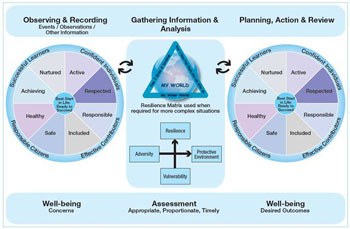Preparing for Multi Agency Meetings

Some Tips on Preparing for Multi- Agency Meetings and ensuring the involvement of Children, Young People and their Families.
Ensuring that we listen to the views and wishes of children and young people we work with and take these into account, is not only enshrined within “Getting it right for every child” and the Child Planning Process, but also in all National Guidance relating to Children and Young People and in The U.N Convention on the Rights of the Child.
The U.N. Convention promotes the view that children are equal citizens, with equal rights, in a world often dominated by adults, and puts responsibility on anyone who engages with children to ensure their rights are upheld.
In summary Article 12 states that when adults are making decisions that affect children, children have the right to say what they think should happen and have their opinions taken into account.
Article 12 does not interfere with a parent’s right and responsibility to express their views on matters affecting their children, and does not give children authority over adults.
The Convention recognises that the level of a child’s participation in decisions must be appropriate to the child’s level of maturity. Children’s ability to form and express their opinions develops with age and most adults will naturally give the views of teenagers’ greater weight than those of a preschooler, whether in family, legal or administrative decisions.
One of the challenges within the Child Planning Process is to ensure that we continue to genuinely involve young people in their assessment and planning as we move through the process.
It is anticipated that practitioners will have developed a child centred approach, which ensures that they actively seek and listen to the views, feelings and wishes of young people within their own working environment.
It is essential that this approach is maintained when several agencies combine together at a meeting to create an action plan to help the child or young person achieve their potential.
The child or young person should still actively contribute to the assessment and planning process and their views should be heard and taken account of by the “team around the child”. This applies to all children if we are to “Get it right for every child.”
Prior to calling a multi- agency meeting (Child Planning meeting), practitioners should have made an assessment of the child /young person’s needs and considered what their own agency/service can do to improve outcomes for them. They should also have considered whether specialist input from within their own agency/service could be called upon to support the child.
If it is clear that the practitioner or their service cannot improve outcomes for the child /young person, and other agencies or services are required, then a Child Planning meeting may be the most appropriate way to draw up an Action Plan.
The following is a checklist of actions which should be considered before and after a Child Planning meeting to ensure the participation of the Child/ Young Person and the adults involved in their care.
- Why do I think a meeting is required? What is the purpose? What’s to be gained?
- Have I discussed the need for a meeting with parents and child/ young person, and explained my assessment and analysis of the situation to them?
- Have I obtained explicit consent to information sharing from parents and child /young person (dependent on age and level of understanding) ?
- Have I explained who will be present at the meeting?
- Would it be helpful for parents to meet participants they do not know, before the meeting?
- Considering everyone’s needs- where is the best place to hold the meeting?
- Who will organise the meeting?
- How will I support and enable parents to express their views and wishes or have them represented?
- How will I support the child /young person to express their views and wishes or have them represented?
- If parents or child /young person choose not to attend, who will represent their view?
- Is there someone in the family network of support who the family would wish to attend for support at the meeting?
- Have I planned time for a post meeting de-brief with the child /young person, family, to ensure they feel they were listened to and understand what has been agreed.
Research indicates that when children, young people and their families feel fully included, having been central to the assessment, planning and review processes, that they are more likely to work with professionals on agreed action plans and that outcomes for children are more positive as a result.
